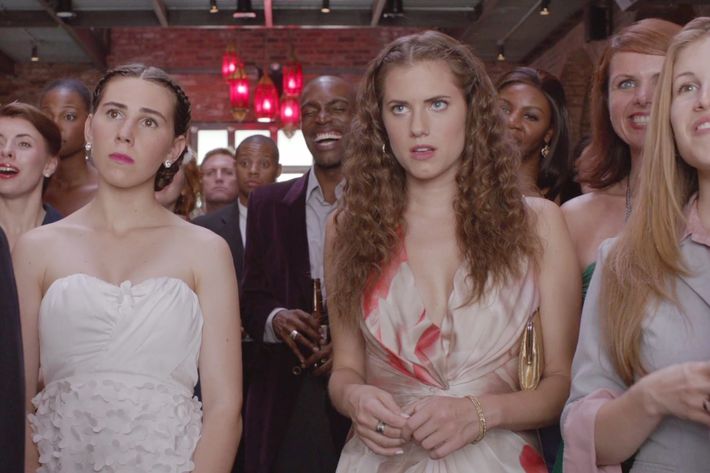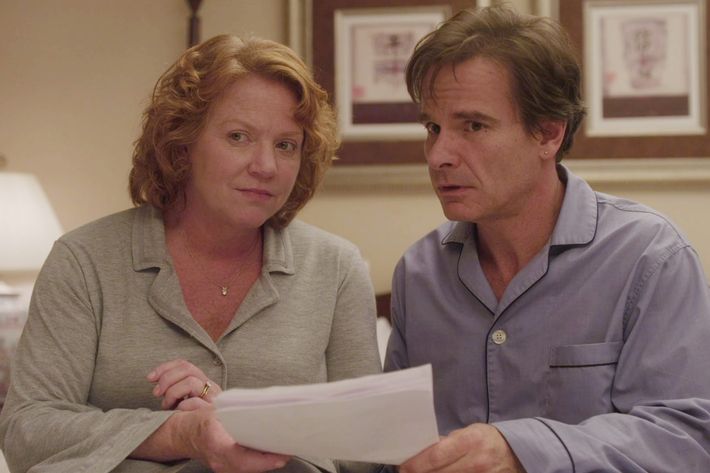
It was after seeing Lena Dunham’s first feature film, 2010’s Tiny Furniture, that Judd Apatow approached Dunham to work on a pilot, which would become the HBO series Girls. Dunham’s debut was funny in an indie movie kind of way — mostly smiles and cringes. During the making of Girls, then, Apatow and Dunham had to ask themselves: How funny should this be? “We had the table read, and then just me, Jenni [Konner, Girls’ eventual showrunner], and Lena sat in a room,” Apatow told Vulture. “Maybe our only important note was, We think this show could be a little funnier than Tiny Furniture. We can go for the comedy a little bit more than you did in the movie, so let’s punch up the script.” Dunham was nervous at first, telling Vulture, “I used to believe jokes were somehow pandering,” but that Apatow and Konner helped her realize “comedy is a universal language.” With Girls wrapping its six-season run, one thing has been clear throughout: Dunham, Konner, Apatow, and the rest of the staff sure can write jokes.
For such a grounded show — which ended Sunday night with a very funny series finale — it’s impressive how many jokes there were or, at least, how many moments it had that were meant to induce laughs. Even Love and Crashing — two shows clearly influenced by Girls, also produced by Apatow and created by actual comedians — don’t have nearly as many. And I think it makes sense, because while Dunham doesn’t have a comedy background, she possesses a greater ability to know when a joke punctures the realism. There is a moment in the Woody Allen movie Crimes & Misdemeanors, in which Alan Alda, playing a TV producer, says, “If it bends, it’s funny; if it breaks, it isn’t.” Allen was supposedly quoting and mocking Larry Gelbart, a comedy writer famous for creating M*A*S*H, a show that pioneered a certain tone of grounded TV comedy — a tone that Girls has updated and pushed forward. Because, honestly, if it breaks, it can still be funny, but the verisimilitude will take a major hit. And Dunham & Co. knew exactly how far it can bend comedically.
It also helps that, over the years, Girls tended to have a writers room made up of an unusual mix of comedians, comedy writers, and non-TV-writer writers. At its best, the writers have been smart about mixing up its types of comedy, not letting one note be so loud that it shatters the thin glass of reality. Of all the main characters, Hannah and Elijah — the characters who are supposed to be funny inside the show — are the ones who actually deliver jokes and make pop-culture references. Usually, though, the other characters’ comedy comes in a pretty traditional sitcom way: from how their personalities rub against one another’s. I always loved Marnie and Jessa together in particular, because the former is like a tightly woven wicker ball and the latter an open bag of feathers. Take their conversation about shitting in the street from the second-to-last episode, in which Jessa replies to Hannah’s comment that she saw someone shit in the street:
Jessa: Of course people shit in the street. You’ve shit in the street, right?
Marnie: No.
Jessa [incredulous]: You’re telling me every shit you’ve ever taken has been on a toilet?
Marnie [indignant]: Yes.
Jessa [annoyed]: God, you know, you’re impossible.
That’s a sitcom scene, in the best way. In this vein, Girls was also incredibly good at writing fight scenes (something Apatow especially loves to put in all his projects) that feel genuine, but are also so funny. Take this classic:
Characters on the fringes of the show typically got to take bigger comedic swings, knowing their arcs are limited. It’s partly why Girls had so many comedian guest stars — Mike Birbiglia, Donald Glover, Amy Schumer, Jenny Slate, Bobby Moynihan, Jorma Taccone, Marc Maron, Chelsea Peretti, and in the finale, as Marnie’s FaceTime sex pilot, Brad Morris. Though I think it was the performance of a non-comedian, Ebon Moss-Bachrach, who plays Desi, that might’ve been the show’s most consistent comedic swing. Moss-Bachrach brought a cartoonish level of twitchy earnestness and sensitivity to the role. He was able to pull off a scene like one this season, when he asks his drug counselor in front of Marnie if he could have water, proceeds to pour himself a full glass, and promptly chugs it in its entirety. That’s a big comedy move that just barely worked, and probably wouldn’t have if it were performed by one of the main characters, who necessarily need to be more grounded. (There is one case where Girls’ handle on a main character really got away from them. Namely, when Shoshanna became like Winston from New Girl in the show’s third season, in a way that was funny, but on a show like Girls made you wonder if she literally had a cognitive disability, like Margaret Lyons thought at the time.)
The show was also very deliberate in its use of big TV moments — like the beach-house dance routine or the “I Love It (I Don’t Care)” scene — that are more fun than laugh-out-loud funny, but still tonally risky, as people don’t usually memorize professional choreography with their friends. Physical comedy in the traditional sense was used sparingly on the show, but Hannah did one time fall over on her bike and it was very funny.
Comedy also surfaced in some of the show’s sex scenes (remember how Booth Jonathan had sex?); more often it was expressed visually in how the characters dress. Hannah, as Dunham has noted, was always meant to dress poorly in ill-fitting clothing. While this is part of their characterization, they also all had the tendency to try to dress boldly in ways that are clearly meant to lend the show an element of silliness. My absolute favorite example of this was how Marnie dressed for Jessa’s wedding:

Which brings me to cringe comedy. I’m not sure how much Dunham watched Curb Your Enthusiasm and The Office, but both were big influences on mumblecore, a genre that Dunham’s early work somewhat fits into. And you could see it. Hannah and the rest of the characters had personalities that are not meant to fit comfortably into the world, and we felt it. Oh, did we feel it. When was the last time you watched that scene when Marnie sang “Stronger” at a party?
Much of the show’s cringe comedy was a large part of its satire as well, going all the way back to the show’s most well-known — and because it’s Girls — most controversial joke: “I don’t want to freak you out, but I think that I may be the voice of my generation. Or at least, a voice of a generation.” Some took this joke from the pilot to be the show’s mission statement, but in the moment, it was clearly meant to be satirical. Look at her parents’ uncomfortable reaction:

This tension was at the core of much of the disagreement about the show, in which some believe Girls was celebrating what it was actually trying to mock. This gets at what was so compelling about the show’s brand of satire. Where a more pointed satire makes it crystal (and, in my opinion, tediously) clear that the writers are against their subject, Girls was ambiguous. I don’t want to be another journalist comparing good TV to a book, but the way in which the show refrained from indicting its characters sometimes did feel less like TV and more like literature. (Here is a New Yorker piece about the specific literary tradition Girls is a part of.) Dunham, Konner, and their staff may have thought what the Girls’ girls did was wrong, embarrassing, or naïve, but they loved them in spite of and because of it. Take the series finale’s biggest comedy moment: a cop slowly driving behind Hannah to make sure she got home okay. The scene came out of Hannah’s initial narcissism and immaturity, but resulted in a joke in which she was clearly cared for.
As Emily Nussbaum wrote in her New York profile of Dunham ahead of the first season, “Girls was a bold defense (and a searing critique) of the so-called Millennial Generation by a person still in her twenties.” When I’ve heard comedians praise Girls, it’s in how Dunham is able to make art about the age she still currently is, as more often writers will write about a period of time in their life after they have distance from it and a different perspective. As a result, what made Girls so special was how specific and lived-in the universe and, consequently, the satire was. (This is also the source of another controversy, as specificity comes at the cost of inclusivity.)
Since this might be the last time I ever get to write about it, here is my favorite (loosely defined) “joke” from Girls. The first season ends with Hannah finally convincing Adam to be in a relationship with her. Adam is game, and later, even offers to move in with her when Marnie leaves Hannah roommate-less. Toward the end of the episode, at Jessa’s wedding, Hannah tells Adam she decided to have Elijah move in with her, so he no longer has to. This sets Adam off. “Is this the game? You chase me like I’m in the fucking Beatles for six months, and then when I finally get comfortable with things you wanna shrug?” he screams. It goes a little like this:
Hannah eventually leaves on the subway, falls asleep, and wakes up with her purse stolen. Unsure where she is, she goes for a walk and finds herself strolling along the Coney Island boardwalk. She plops down in the sand, stares at the water, and starts eating the leftover wedding cake she has out of her hand. I find this image to be hilarious. Five years later, I think about it all the time and laugh. I don’t know what the character is thinking. Knowing Hannah, as we do, it’s not regret or How can I be a more communicative partner? or How am I going to get home with no money or cell phone? It’s this will make a good story. It might be naïve or stupid or wrongheaded, but I don’t care, I love it. And so did Girls.


